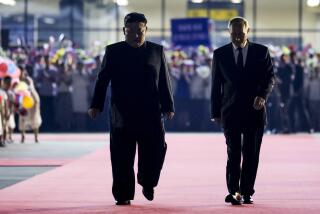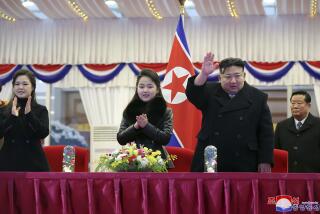Op-Ed: If Kim Jong Un dies, who’s next in line for his seat? North Korea has no idea
The fog of rumors about Kim Jong Un’s health will clear up soon. But as of now, despite persistent rumors that the North Korean leader is seriously ill or even dead, the only two things we know with certainty are that Kim uncharacteristically missed the Day of the Sun public anniversary celebrations commemorating his grandfather Kim Il Sung’s birthday, and that his private train has been observed at the station in Wonsan, a fact the South Korean government cites to bolster its assertion that the North Korean leader is staying outside the capital but is not in the midst of a medical crisis.
But even if Kim showed up tomorrow hearty and hale, with an alibi for his absence and a clean bill of health from his doctor, it’s clear that North Korea has a dangerous succession problem. Yes, it’s a resilient monarchical regime that has managed the succession process twice. But North Korea’s political system is a Frankenstein-like mash-up of models: It is simultaneously a hereditary monarchy, a Leninist dictatorship, a religious cult and a Mafia-style family racket. Its ideology requires that the ruler must be a direct descendant of Kim Il Sung — part of the so-called “Mt. Paektu bloodline.”
Kim Jong Un’s oldest known child was born in 2010, which means there is no adult fourth-generation “prince” of the Kim dynasty ready to take power and hold onto it. The only currently viable adult candidates seem to be Kim’s sister, Kim Yo Jong, and his brother, Kim Jong Chul.
The sister holds the rank of a vice minister and prominently appears in state media and at diplomatic events — holding Kim’s ashtray or representing him at the Winter Olympics. But North Korea is a highly patriarchal society. With a few exceptions (such as the vice foreign minister, Choe Son Hui), North Korea’s senior leaders are male. So the odds of a young and female Kim emerging as the supreme leader are quite low.
As for Kim Jong Chul, he was passed over by his father twice — first in favor of his older half-brother, Kim Jong Nam, who fell out of favor and was eventually murdered, and later for his younger brother, Kim Jong Un. His father, Kim Jong Il, reportedly derided Kim Jong Chul as being “like a little girl,” and he, unlike his high-profile sister, has been excluded from power and the inner leadership circle. So it is difficult to see either of Kim’s siblings serving as anything more than pawns or temporary figureheads for others who would wield power.
Although North Korea has a nominal political structure — a ruling party, a prime minister, government institutions, a military — it would be wishful thinking to imagine the political succession would move in a conventional or even an orderly manner.
The Democratic People’s Republic of Korea is a brutish police state with multiple powerful and competing security forces. Kim Il Sung and his successors took great care to prevent any group or institution from acquiring power, deliberately pitting one faction or agency against another to keep them off balance and at odds.
This strategy has precluded the military or security services from conspiring or threatening the Kim dynasty. Moreover, it has been barely six years since Kim Jong Un executed his own uncle, Jang Song Thaek, and systematically purged the other powerful officials who guided his assumption of power. Five of the seven senior officials who walked with Kim in the funeral procession are dead or disappeared, and the two who remain are in their 90s. So not only is there no obvious successor in the royal Kim family, the ranks of veteran officials have been thinned.
This means that the prospect of a cutthroat power struggle in the wake of Kim Jong Un’s death is high, whether it has already happened or occurs a decade from now. A messy contest for power in Pyongyang puts control of the nation’s nuclear arsenal (or arsenals) at the center of a stupendously dangerous competition. The combination of loose nukes and political conflict is a nightmare scenario for the world.
Whoever prevails in the battle among rival power centers, North Korea’s perception of the threat from abroad, and its reliance on a nuclear-missile deterrent to meet that threat, are highly unlikely to change for the better. And a new leader will face the same geostrategic vulnerabilities as did Kim — North Korea is still going to be an economic basket case, overdependent on China, under strong pressure from powerful neighbors, struggling to feed its population and handicapped by international sanctions. It will remain uncomfortably dependent on China for political cover, trade and supply chains. It will inherit decades of anti-American doctrine and a deep fear of U.S. military power.
The unhappy conclusion from all this is that North Korea will likely have no more incentive to surrender its nuclear deterrent in a post-Kim world than it has had in the past.
Daniel Russel is vice president of the Asia Society Policy Institute.
More to Read
A cure for the common opinion
Get thought-provoking perspectives with our weekly newsletter.
You may occasionally receive promotional content from the Los Angeles Times.










